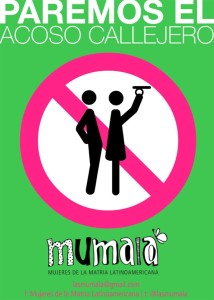 International Anti-Street Harassment Week officially kicks off tomorrow, but the global activism is already starting…!!
International Anti-Street Harassment Week officially kicks off tomorrow, but the global activism is already starting…!!
Last year, there was legislation passed in Argentina to designate an annual day against street harassment, to coincide around the time of International Anti-Street Harassment Week.
The day was yesterday and The Movement of Women of the Motherland of Latin American released a new study showing 100% of women in the City of Buenos Aires have experienced street harassment. The full survey results are available in Spanish. They include the following:
“Half the participants reported being subjected to sexually explicit comments, 59 percent reported obscene gestures, 47 percent had been followed by a man and 37 percent reported having a man’s genitalia exposed to them unasked…
87 percent reported avoiding dark or deserted streets, 63 percent won’t walk in certain areas unaccompanied and 51 percent dress in a manner that ‘doesn’t attract attention.'”

The survey is part of larger campaign launched by MuMaLá called #ParemosElAcosoCallejero (#StopStreetHarassment).
The campaigners have an up-hill battle as the country’s President once said, “All women like to be told compliments, even if if it’s something something rude like, ‘What a cute ass you have’… it’s all good,” but documenting the problem and showing the negative affects it can have is an important way to start changing public opinion.


